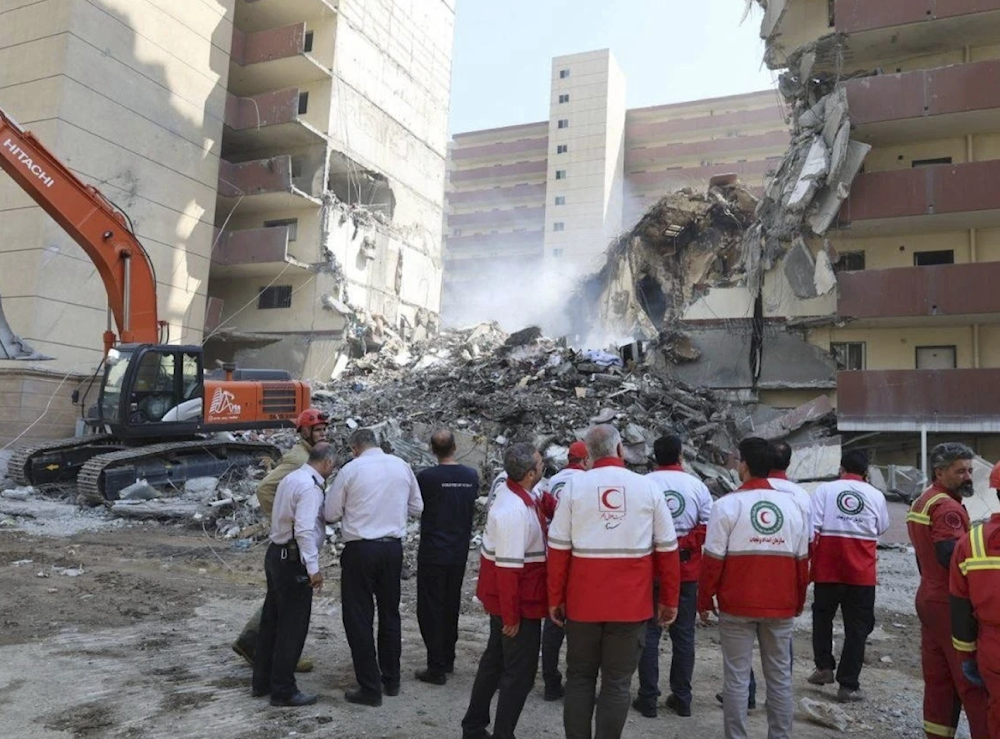Iran accuses 'Israel' of environmental war crimes during aggression
Iran's Department of Environment denounces 'Israel’s' attacks on fossil fuel storage sites and industrial infrastructure as "a destructive assault on the natural environment."
-

Iranian Red Crescent Society rescuers work at the scene of an explosion after an Israeli strike in Tehran, Iran, on June 13, 2025. (AP)
Iran’s Department of Environment (DOE) has accused "Israel" of committing environmental war crimes during its recent 12-day aggression on the country, warning that attacks on oil depots, refineries, and protected natural areas have triggered a wave of toxic pollution endangering public health, biodiversity, and ecological stability across the region.
In a statement released Sunday, the DOE condemned "Israel’s" strikes on fossil fuel storage and industrial infrastructure, describing them as "a destructive assault on the natural environment and biodiversity."
The agency cautioned that the environmental fallout could have lasting effects on Iran’s air quality, water systems, and fragile ecosystems.
The accusation follows Israeli airstrikes that, according to Iranian officials, hit multiple oil depots in western and southern Tehran, igniting massive fires and releasing clouds of hazardous smoke. The DOE reported that more than 900,000 acres of protected land were impacted, with at least 12 conservation areas reportedly set ablaze.
The Israeli occupation targeted oil reserves close to Tehran which burned "millions of kilograms of different types of fuel, leading to the leakage and spread of tons of greenhouse gases and tons of toxic gases that have been spread into the air," the department stated, adding, “For all 12 days of the conflict, Tehran did not have a single day of clean air."
Toxic fallout, infrastructure damage raise alarms
Additional damage was reported in the city of Rey, as well as at petrochemical facilities in Kangan and Bushehr. Air quality monitors in the affected areas have detected alarming spikes in carbon monoxide, soot, and other airborne toxins, raising serious concerns among environmental scientists and public health officials.
“This is not just a health emergency—it is an environmental disaster,” the Department of Environment (DOE) stated, warning of the far-reaching spread of pollutants through critical ecosystems. “These irresponsible actions have long-term impacts on air quality, water resources, and natural habitats.”
The DOE also revealed that some of its own infrastructure was directly targeted and that the conflict has severely disrupted emergency response operations and conservation efforts nationwide.
“These acts must be addressed decisively by the international community,” the agency urged. “While climate change and environmental degradation are already major global challenges, the deliberate destruction of the environment through military attacks cannot be tolerated.”
Calls for international accountability and action
Iran has urged the international community to explicitly condemn the recent strikes at global forums and to apply pressure to halt what it described as the “ongoing destruction of the region’s ecosystem.”
Citing Articles 35 and 55 of the Additional Protocol to the Geneva Conventions, which define widespread, long-term, and severe damage to the natural environment as a war crime, Iranian officials warned that the environmental costs of modern warfare are too often overlooked.
“This is a powerful reminder that the consequences of armed conflict reach far beyond the battlefield,” the Department of Environment (DOE) stated. “The environment, too, is a casualty.”
The DOE called on the United Nations Environment Programme (UNEP), the International Union for Conservation of Nature (IUCN), and other regional and global bodies to take urgent steps to prevent further ecological destruction and mitigate the risk of environmental catastrophe.
"Our duty is to defend the nation's right by documenting all those crimes and by pursuing [them all] in every possible way," the department added.

 4 Min Read
4 Min Read








